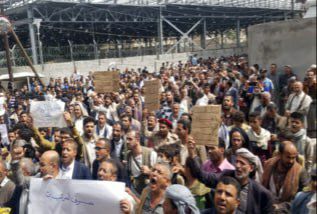SANAA, May 24 (YPA) – The Americans have been still putting obstacles in front of the process of achieving peace in Yemen through their ongoing interventions in the Yemeni file and pushing towards not achieving any agreement between Sanaa and Riyadh on the humanitarian file, foremost of which is paying the salaries of all state employees from oil revenues.
In a report issued by Yemen Press Agency, the new American complications of the peace process in Yemen, what was reported by many media outlets about the UAE-backed Southern Transitional Council (STC) receiving a green light from the US ambassador Steven H. Fagin, during his meeting on Tuesday, with deputy head of STC, Faraj Al-Bahsani, to refuse to pay salaries from oil revenues.
Observers considered refusing to pay salaries from oil revenues an American insistence on thwarting peace efforts in Yemen, especially these steps were preceded by the adoption by the coalition-backed government of refusing to pay salaries, according to its prime minister, Moeen Abdul Malik, who said in an interview with the “Anadolu” Agency that the issue of salaries has been resolved, and that salaries will not be paid from oil revenues according to what was agreed upon between Sanaa and Riyadh, while pro-coalition media said that the American ambassador was the one who informed Moeen of rejecting proposals in this regard.
The American desire not to pay salaries and link them to the so-called comprehensive political settlement was not a spur of the moment. Rather, the Americans have started it since the launch of the talks between Sanaa and the coalition with Omani mediation. This was evident in the statements of many American officials, including the American envoy, “Tim Lenderking,” who stressed in more than one speech that the United States linked the issue of salary payments to a comprehensive political settlement.
Some observers emphasized that the American steps and attempts to complicate the peace process in Yemen have exposed the US policy towards Yemen, which America is trying to keep under war and siege to achieve its own agenda. That is why it is doing its utmost to prevent the achievement of a political agreement in this country.
On the other hand, Sanaa’s position has appeared more stable with regard to the implementation of the provisions of the humanitarian file, including the payment of salaries of state employees from oil revenues as a prerequisite for achieving peace in Yemen, which was confirmed by Sayyed Abdul-Malik al-Houthi in all his speeches, in which he said: The situation that the coalition wants to impose by suffocating the Yemeni people and depriving them of their wealth will not continue indefinitely, and that Sanaa will take military action against every attempt to plunder Yemen’s wealth, in any province of Yemen, on land and sea.
AA


